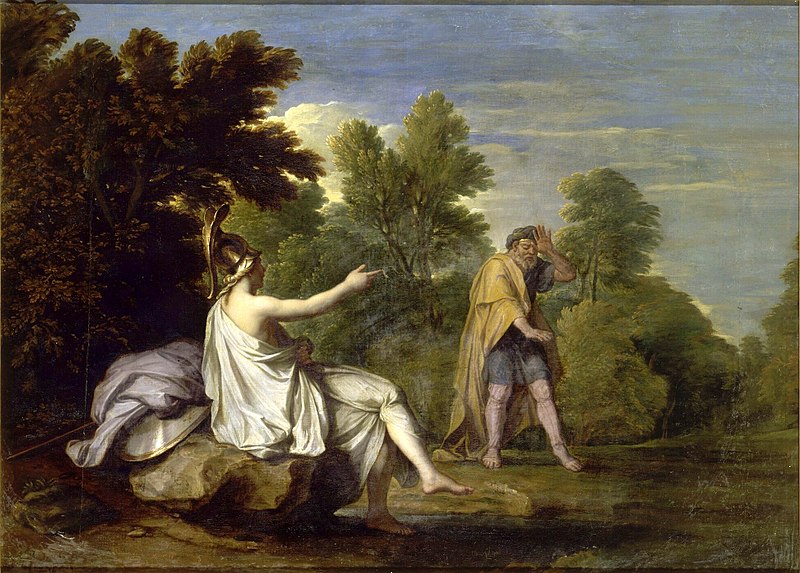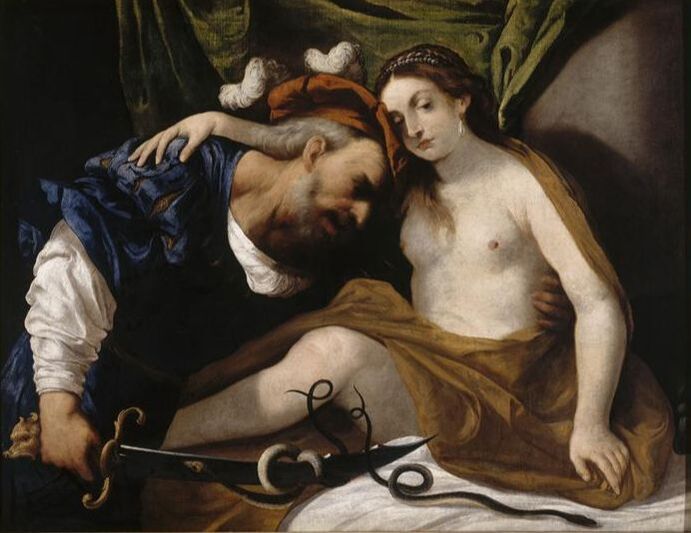TIRESIAS IN GREEK MYTHOLOGY
Tiersias was a legendary seer of Ancient Greece, who, in the tales of Greek mythology, had a lifelong association with the city of Thebes.
Tiersias Son of Everes
Tiersias was said to be the son of the shepherd Eueres and the nymph Chariclo. Some claim that Tiersias was a descendant of Udaeus, one of the Spartoi, although this is problematic, for it was also said that Tiersias was an advisor to Cadmus.
Tiersias the Blind SeerTiersias was one of the great seers of Greek mythology, seemingly unhindered by the fact that he was blind. There are various stories of how Tiersias gained his power, and how he became to be blind.
The least poetic version of the tale, is simply that Tiersias was born with his prophetic ability and was then blinded by the gods when he revealed too much to mankind. |
|
Tiersias and Athena
A different version is told where both the gift of prophecy, and his blindness, was bestowed on Tiersias by the goddess Athena.
Into adulthood, Tiersias was just a normal man, but one day, whilst hunting, accidentally came upon the goddess Athena bathing naked in a pool. Athena immediately blinded Tiersias for his “crime”. It was only then that she realised that Tiersias was the son of Chariclo, one of Athena’s attendants.
It was not within Athena’s power to reverse the blindness of Tiersias, so instead she Athena cleansed his ears so that he would thereafter be able to understand the birds and animals, and to understand the meaning of offertory smoke when it was described to him.
Athena would also bestow upon Tiersias a long life.
Into adulthood, Tiersias was just a normal man, but one day, whilst hunting, accidentally came upon the goddess Athena bathing naked in a pool. Athena immediately blinded Tiersias for his “crime”. It was only then that she realised that Tiersias was the son of Chariclo, one of Athena’s attendants.
It was not within Athena’s power to reverse the blindness of Tiersias, so instead she Athena cleansed his ears so that he would thereafter be able to understand the birds and animals, and to understand the meaning of offertory smoke when it was described to him.
Athena would also bestow upon Tiersias a long life.
The Transformation of TiersiasWhen Tiersias was a young man he came upon two snakes mating, and stamping on them, he ended up injuring the female snake. Tiersias was then transformed magically into a woman; though some say the transformation was done by an angry Hera.
For seven years Tiersias lived as a woman, marrying and having children. Then, Tiersias came upon the same two snakes mating again, and stamped on them again, this time injuring the male snake, and Tiersias was transformed again into a male. Afterwards, Tiersias was asked to adjudicate in an argument between Zeus and Hera. The gods were arguing about which, the man or woman, enjoyed sex more, and with Tiersias having experienced sex from both sides, he came to a decision. Tiersias decided that woman enjoy the making of love more. This was not what Hera wanted to hear, and so the goddess blinded him. Zeus could not undo the blinding of Tiersias, but instead bestowed upon him his prophetic ability and his long life. |
|
The Long Life of Tiersias
Tiersias was generally said to have been blessed with a long life that would last for seven generations; and Tiersias would, almost exclusively, be associated with the city of Thebes.
The only main myth involving Tiersias away from Thebes, when the seer told the mother of Narcissus that her son would have a long life, as long as he did not know himself.
The only main myth involving Tiersias away from Thebes, when the seer told the mother of Narcissus that her son would have a long life, as long as he did not know himself.
Tiersias and Thebes
|
Tiersias was an advisor of Cadmus, the Greek hero who had established the city of Thebes, although at the time it was known as Cadmea. During the foolish reign of Cadmus’ successor, Pentheus, Tiersias accompanied Cadmus, to inform Pentheus of the folly of questioning the divinity of Dionysus, although this advice was ignored, with deadly consequences for the king.
Several generations later, Alcmene and Amphitryon were in exile in Thebes when Alcmene became pregnant by Zeus, and it was left to Tiersias to explain to Amphitryon the reason why Alcmene believed that her husband had come home a day earlier than he had. Later still, Tiersias became an advisor of Oedipus, but when Oedipus sought answers about who had killed his father, Laius, Tiersias simply said that the killer was someone that Oedipus did not wish to find. When Oedipus became angry about this response, Tiersias revealed the truth, that Oedipus himself had killed his father. This revelation would lead to the deposing of Oedipus, which in turn led to disagreement between Oedipus’ two sons, Polynices and Eteocles, and war. The Seven Against Thebes made war in attempt to put Polynices on the throne, but again, Tiersias acted as advisor to the Thebans, informing them that if Menoeceus, son of Creon, willingly sacrificed himself, then Thebes would not fall. These words of Tiersias did indeed prove truthful, but ten years later, the sons of the Seven, the Epigoni, returned for vengeance. |
|
Death of Tiersias
Following the defeat of the Theban forces at the Battle of Gilsas during the War of the Epigoni, Tiersias proclaimed that the city of Thebes should be abandoned. The Thebans would this leave their city, and eventually build a new city at Hestiaea on Euboea.
Though, Tiersias left with the other Thebans he never reached Euboea, for he drank of a tainted spring at Telphussa, and the long life of Terisias came to an end.
Though, Tiersias left with the other Thebans he never reached Euboea, for he drank of a tainted spring at Telphussa, and the long life of Terisias came to an end.
Tiersias After Death
Death did not stop Tiersias from making further appearances in the tales of Greek mythology, for famously, the seer appears in Homer’s Odyssey. In the Underworld, Tiersias was seen by the Greek hero Odysseus, with the seer managing to give valuable advice to Odysseus for his journey home.
It was Tiersias who first advised Odysseus about the anger of Poseidon, and the dangers that lay ahead with the deadly passage past Scylla and Charybdis, the jeopardy of eating Helios’ cattle, and even the peril that Odysseus would face in his own palace.
It was Tiersias who first advised Odysseus about the anger of Poseidon, and the dangers that lay ahead with the deadly passage past Scylla and Charybdis, the jeopardy of eating Helios’ cattle, and even the peril that Odysseus would face in his own palace.
The Daughters of Tiersias
|
Three daughters of Tiersias are named in ancient sources, although they may be different names for the same daughter. It was said that Tiersias became a mother whilst in female form, but he may have also fathered a daughter, or daughters later.
One named daughter of Tiersias was Historis, who was said to have aided Alcmene during her pregnancy. Though, Hera sought to stop Alcmene giving birth, Historis, would proclaim the birth of a son before he was born, tricking Ilithyia (the goddess of childbirth) and the others who sought to stop the birth. A similar tale is also told of Galinthias, Alcmene’s handmaiden. When Thebes fell to the Epigoni, it was said that a daughter of Tiersias, Daphne, was captured, despite Tiersias telling all to flee. Daphne was considered the most beautiful of all Theban maidens, and so the Epigoni, having vowed to give their fairest of their war prizes to the sanctuary of Delphi, in praise of the gods, did so. Daphne had already inherited her father’s divination skills, but at Delphi she was said to have learnt even more. Daphne was perhaps the same as another named daughter of Tiersias, Manto. Manto, it was said, left mainland Greece, for Ionia after the death of her father, and their married Rhacius, the leader of Cretan colonists. Manto would then give birth to a son called Mopsus. Mopsus would become a seer of the highest order, and it was Mopsus who defeated Calchas in a divination contest, leading to the death of Calchas. |
|
|
|
Colin Quartermain - Tiresias - 4th October 2021

